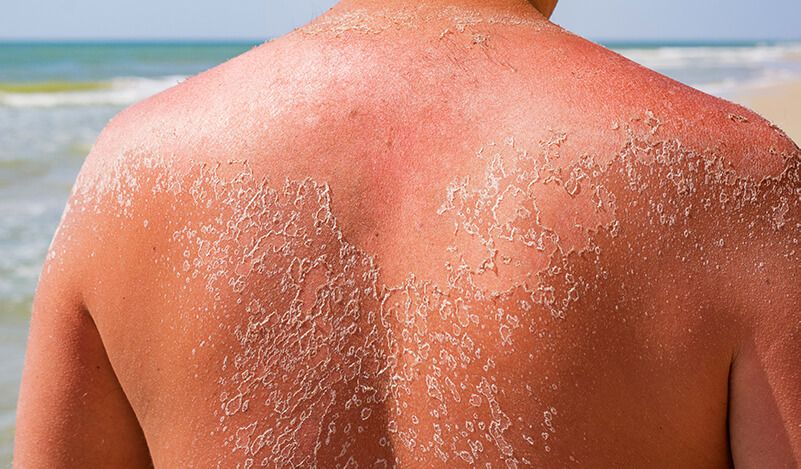Ask A Dermatologist: Why Is My Skin Peeling?

Skin peeling or flaking is a highly undesirable yet fairly common issue that occurs when areas of the epidermis (top layer of skin) become flaky and slough or peel off. While there are many different causes of skin peeling, it is usually an indication that there is some type of irritation or problem the skin is experiencing. Most forms of peeling are non-serious, however if you notice persistent or recurring peeling it may be a sign of something serious and dermatologist attention may be required.
In this post, we’ll discuss common causes of skin peeling, effective treatments for most forms of skin peeling, and when you should consider seeing your dermatologist.
Where does skin peeling commonly occur?
Peeling skin can occur on many different parts of the body such as the arms, the shoulders, and the face. The area where it occurs depends heavily on the underlying cause of the peeling. In fact, location of peeling skin can often help in diagnosing its root cause.
Common reasons for peeling skin:
Allergic Response
Sometimes, coming in contact with a substance that you are allergic to can cause skin peeling. For example, certain perfumes can cause skin peeling in people who are allergic to them.
Infection
There are several types of infections that can cause skin peeling. For example, scarlet fever can cause rashes in areas of the body such as the elbow, the groin, and the underarm. Sometimes, the skin will peel as these rashes fade. Staph infections such as impetigo can also cause the skin to itch.
Immune Disorders
There are a number of genetic or inflammatory immune-system-related disorders that can cause skin peeling. Kawasaki disease, a rare illness that mostly affects children and causes inflamed blood vessels, is one example, Peeling skin syndrome, which also mostly affects children and newborns, is another. With peeling skin syndrome, the hands, feet, and sometimes the whole body start to peel.
Idiopathic Disorders
Idiopathic disorders are disorders with no identifiable causes. For some individuals who experience skin peeling, the disorder is idiopathic, meaning that the exact cause is unknown.
Skin Cancer
Skin cancer and skin cancer treatments like radiation can both cause the skin to peel. Sometimes, with radiation treatment, the areas that were treated turn dark, become dry, start to itch, and peel.
Chronic Skin Conditions
These conditions are very common. In fact, over 31 million people in the United States experience eczema. Skin peeling can be a common symptom of eczema, rosacea, and psoriasis. So, if you have one of these conditions, you could experience some skin peeling as a symptom.
Medication Side Effect
Certain medications such as acne treatments and cosmetic peels contain retinol. Some people who use these medications can experience peeling of the skin due to the retinol content. However, this type of peeling usually goes away naturally once the skin adjusts to the retinol.
Sunburn
Many sunburns can result in skin peeling. Unfortunately, these types of sunburns are often quite painful and can cause a lot of discomfort for the sufferer. However, the peeling usually goes away in a few days or weeks.
Use of Harsh Skin Care Ingredients
Some skincare treatments contain harsh chemicals or ingredients that can irritate the skin and cause peeling. For example, all of the following ingredients can cause skin peeling in some individuals: isopropyl alcohol, benzoyl peroxide, alpha hydroxy acids, salicylic acid, and surfactants.
Treatments for skin peels
There are a number of treatments that might be used to alleviate skin peeling. For example, aloe vera, hypoallergenic moisturizing cream, and allergy medications might be used to treat skin peeling. There are a number of other things that can be helpful to reduce the peeling of the skin such as bathing in warm as opposed to hot water – hot water is drying. Using humidifiers to add more moisture to the air can also be helpful for preventing dry skin that can be subject to peeling.
Sometimes doctors will try corticosteroids, non-steroidal anti-inflammatory drugs, antibiotics, or antifungals in order to treat peeling, depending on what they think the cause is. Sometimes the cause is unclear and thus multiple treatments have to be tried. If the cause is a mild sunburn, aloe vera is often enough to stop the peeling by itself.
When to see a doctor?
You should see a physician if the peeling is severe, or if there are other signs of an infection such as chills or a fever. A dermatologist should also be consulting if the peeling lasts for more than a few days and does not seem to be getting any better. When you see the doctor, he or she will look at the peeling skin and try to identify the particular cause of it. Once this process is complete, the doctor will prescribe a treatment based on the cause.
Hopefully, the doctor will be able to immediately identify the cause of the skin peeling and can address it quickly and effectively. The cause of most cases of skin peeling will be able to be correctly identified by doctors. However, in rare circumstances, the doctor might not be able to identify the exact cause. In those instances, multiple treatments can be tried until a successful method that reduces or eliminates the peeling is found.
Disclaimer: The contents of the Westlake Dermatology website, including text, graphics, and images, are for informational purposes only and are not intended to substitute for direct medical advice from your physician or other qualified professional.
